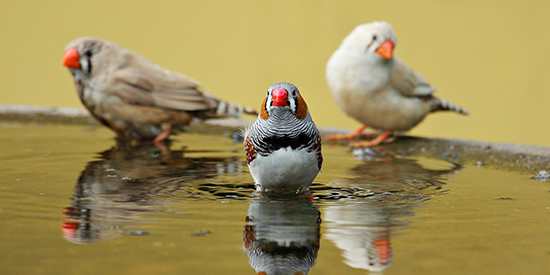World-first Deakin study shows early trauma affects birds' song memory
Media release
New Deakin research linking early trauma in birds with their ability to remember important songs used for survival could have implications for human development.
Authors of the research, published today in Proceedings of the Royal Society of London B: Biological Sciences, say the findings could shed light on the effects of early-life stress on speech and language development in children, as humans are the only other group of animals distinct from birds to show dedicated parts in the brain for vocal learning.
Lead researcher Professor Kate Buchanan, an avian behavioural ecologist in Deakin's Centre for Integrative Ecology, said the discovery was critical as the world's birds used songs to help mate successfully and protect each other from predators, but they faced increasing stress from changes to climate and habitat.
"This study shows for the first time that stress in early life affects the ability of birds to form accurate memories of the songs that are relevant to them," Professor Buchanan said.
"When it comes to humans we can observe there are links to suggest a similar pattern in language development too.
"Of course it would be unethical to run experiments with children to determine if stress affected vocal learning. But the data we have gathered in this study suggests that stress affects how neural connections form, when and how auditory memories are formed. It’s entirely plausible that such effects are common to birds and humans.
"Since birds and humans are the only animals known to have dedicated brain areas for learned acoustic communication, these results may help explain how early-life stress affects human speech and language development. We already know that this occurs in humans but our work can now give indication to the mechanism."
As part of the study, researchers at Deakin in Waurn Ponds and Rutgers University in the US, looked at two groups of zebra finch nestlings, one in normal conditions and the other raised on restricted food supplies.
"In both experiments the nestlings that were food restricted grew more slowly, but compensated near the fledging period and once they became adults, they did not differ in mass," Professor Buchanan said.
"In both experiments we played back the father's song to their sons once adult. As fathers teach their sons in the wild with a song, we sought to test if the sons had learned their song properly and if the brain responded to the father’s song the same in both experimental groups.
"We looked at both gene expression and electrical activity in the brain in response to playback of the father's song, and found that early nutritional stress decreased the ability of the brain to respond to the father's song and recognise this acoustic signal.
"The brain response to playback of familiar, recently heard songs was reduced in nutritionally deprived birds too, showing that early-life stress also affects the ability to recognise and remember sounds learnt in later life."
Co-author Dr Alizee Meillere, an Associate Research Fellow in Deakin's School of Life and Environmental Sciences, said this suggested individuals that experienced early-life stress might not be able to recognise other members of their species as effectively as those that grew in ideal conditions.
"They are social birds. They need to know who is part of their group in order to recognise them, to settle into a territory and integrate into the population. So learning this dialect is important," Dr Meillere said.
"They use songs to get to know their friendly neighbours and warn each other about predators, but most importantly to attract a mate.
"If the males don't have a complex song, then the females won't be interested, and the song can also prevent cross-species mating, which would result in infertile eggs."
Dr Meillere said that with current trends around climate change and other environmental degradation, birds had to cope with an increasing number of stressors, and if scientists could better understand how this would affect them it could help ensure their survival.
"We know from similar research that other stressors like increased pollution could have the same effect," she said.
As part of further Deakin research, long-term experiments will be conducted to see if these effects are transmitted across generations and if so, how.
The study 'Influence of early-life nutritional stress on songbird memory formation,' was conducted by Deakin University in collaboration with the Max Planck Institute for Ornithology, Germany, and Rutgers University, USA.
Media contact
Share this story

Key Fact
Key fact content
